A month ago, we organized Hack the Night — a 24-hour hackathon, exclusively for women. This is the story of all that went on behind the scenes.
I got to know about Arya, SKG and Rethink around December 2017. Arya was leading the Opportunity Project at Rethink at the time. When I learnt that a Women-in-Tech initiative was being launched for female engineering students, I immediately applied for the same. The four weeks program culminated in 5 participants receiving GHCI scholarships — and that was how I met Sijo and Arya finally in person at Bangalore.
We were seated outside a lonely CCD in a corner of the Bangalore International Exhibition Centre. Attendees of GHCI were milling about in the afternoon lull. Remnants of Arya’s birthday cake lay on the table, and a slight breeze was on its way.
When I first told Sijo about wanting to conduct a 24-hour woman hackathon and all of my hopes attached with it, he asked me if I had seen Mohanlal’s search for the perfect house in Nadodikattu.
I stared blankly back at him. He promptly opened up his laptop to show me this scene.
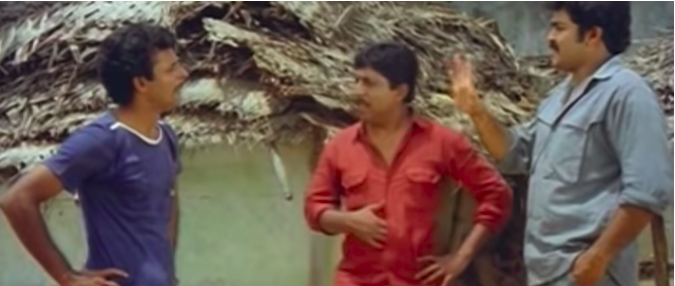 I couldn’t help laughing as I realized what he was getting at.
I couldn’t help laughing as I realized what he was getting at.
I wanted to conduct a women-only hackathon.
I wanted it to be held over 24 hours — which was at the time unheard of in the history of our college, let alone completely for girls. I wanted the participants to build something, a project they could take away as their own, along with a feeling of accomplishment at the end of the day. I wanted the girls to have discussions about tech and what they could do to close the gender gap.
All within 24 hours.
Ah yes, the hopes and follies of a young heart.
The idea had been planted in my first semester in college. A few of us got to attend a Women Hackers workshop by ICFOSS, which was being conducted in colleges all over Kerala. On top of being a girls-only workshop, those two days got us acquainted with the concepts of FOSS for the first time — about looking at freedom in the current times through the lens of software and all the power we’ve allowed it to accumulate over time. The interactive afternoon sessions were the ones that stayed with me — handled by Aishwarya, they were thought provoking, questioning the space we occupy as women — not just in the larger context of the world, but in the closed world of tech.
Hackathons are usually sprints of 24–48 hours in which people sat together to collaboratively develop solutions using code. Due to reasons both obvious and debatable, female participation in hackathons tend to be quite low. I could say that this was how Hack the Night was born — but in reality, it was mostly the desire to create a space to learn and grow free of inhibitions, coupled with the right support at the right time that finally led to the same.
Looking back, it all seems to have clicked right into place after that afternoon. We already had a solid team of people who were hell-bent on making sure this hackathon turned into reality. That day, Sijo asked me to share a shitty first draft — an initial draft of the sort of structure we wanted the hackathon to take up. Through a few video calls in the coming weeks, Arya and Sijo were able to provide us with the perspective shift that was much needed.
Some key takeaways from both of them, keeping up with the spirit of the activities at Rethink:
- Anything that has been useful to you or could be useful to even one person can be and should be published. (The second draft for the hackathon was published here as a medium post, before a call with Arya.)
- To extend our research to all good/best hackathons out there, regardless of geography, and not just to women hackathons (which were few and far in between)
- How do you cater to beginners and experienced coders alike? This was one of our biggest dilemmas — with a solution that was staring us right in the face: Dialogflow, ofcourse! (This was how we came to incorporate the #build activity from the WIT program)
- Give individual focus such that everybody builds their own bot
- Conduct pre-activities so that in-person time could be effectively utilized
- Create published outcomes
The D Day
In the end, Hack the Night evolved into a form that none of us could have ever predicted — but a form that left us satisfied, nonetheless.
We were able to rope in Nikita Mallya to talk about seizing opportunities. Her charisma, energy and the passion with which she handled the crowd was downright powerful — she talked about applying for GHCI and failing, re-applying for GHC and succeeding, and how it was all worthwhile in the end.
 Farha & Rasmi
Farha & Rasmi
When I contacted Farha and Rasmi, (co-participants at WIT and two interesting women in their own right), they were both down for sharing their experiences as well. Farha talked about what she does best — networking and building your tribe. Rasmi took to explaining how she went about the whole process of crowdfunding, and about the need for such an approach.
There were two last minute additions to the speakers roster — two female alumni of our college, who had expressed interest in being a part of this program through Vandana Ma’am. Anitha P (Project Manager, Department of Meteorology, Melbourne) belonged to the batch of 2002, while Anjala Jose (Operations Manager, Weamse Business Solutions) belonged to the batch of 2012. Through two short video call sessions, they were able to convey their experience in college and beyond — connecting with the audience that were predominantly from GCEK, unified by the similarity in their stories despite the gap in time.
The hackathon officially began in the afternoon. Here is where we had to account for a few changes from the original structure — due to the lack of availability of laptops, the participants were given the choice to pair up. All of them created accounts on telegram, and joined the group we had created earlier for facilitating all activities during the event. This group was used to share links and other information after 5 min research sessions (and more importantly as the night progressed: to inform all when the maggi and steaming sulaimani counters were operational).
 Hacking away
Hacking away
A few topics were given to the teams to choose from, so that less time would be spent in deciding on a topic and more focus could be spent on the learning and creating part. After an initial idea presentation session, the participants got right down to building their chatbots from scratch. The participants were also informed that the final presentation was to be done through their very own website (tying in with the need for published outcomes).
The Team
I had a number of concerns in the days leading up to the hackathon. It was structured in such a way that there would be minimal intervention — there were to be no teaching sessions. The participants were spread over two rooms and were encouraged to share their doubts over telegram, if they couldn’t already figure it out with the help of google.
On top if this, Anisha and Alka worked as the technical support system throughout the night, moving between the groups and making sure everyone was on the same page. Anju aechi made sure we were all on our toes — she was a first timer to Dialogflow and would figure out all the potential roadblocks ahead of the participants, thus preparing us for trouble along the way.
Pooja (full time co-conspirator, and co-organizer for Hack the Night) unexpectedly fell sick on Saturday. Vismaya and Ashika stepped up for the occasion, conducting warm up activities that took the edge off of the participants and ensuring everything was in order around the clock. Anjali, Nada and Athira had the tedious task of getting the classrooms look comforting. Cushions and extension cords were crowdsourced for making the workspace friendlier. Around 60 beds were brought in from the Ladies Hostel into the lower level classrooms arranged specifically for accomodation (a precaution, just in case everybody decided to rest by midnight — however, atleast 60% remained unused till the end).
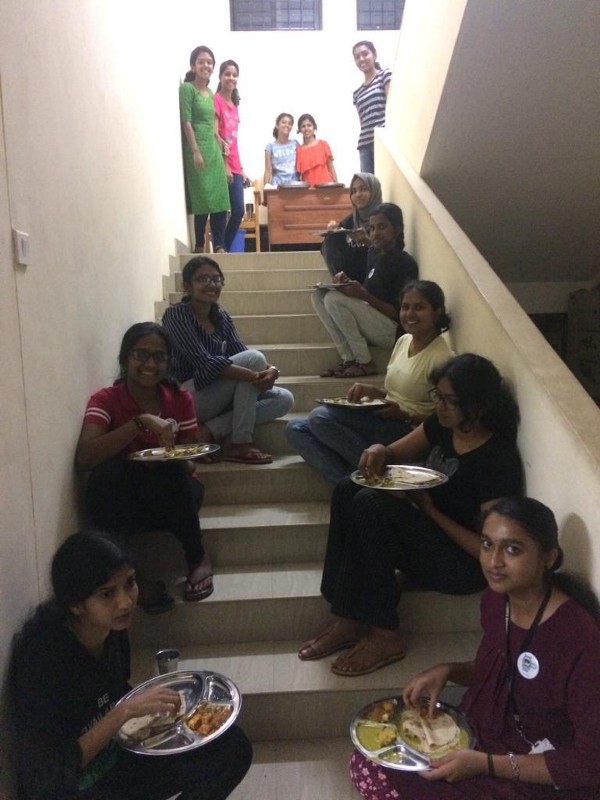
Megha, Vaishaki, Vyshna, Anjana and Varna provided the support Ashika needed in getting the food and refreshments ready on time, as well as in making sure the event was in line with the green protocol we had to follow in college (which meant, among other tasks, cleaning around 70 steel plates and glasses. At midnight.)
Afeefa, Alida and Drishya took care of all the registration related work, as well as the ensuing documentation. Drishya and Swetha anchored the inaugural and talk sessions in the morning. Sreelakshmi and Sandra worked as the transport team — accompanying the speakers between the railway station and college, racing against delays and unreliable train schedules. Not to mention how everyone slipped into multiple roles throughout the two days to fill in the gaps!
The Response and the Road Ahead
After the final submission, a feedback form was sent out to all the participants, with three simple questions — the things they liked the most, the least, and how we may improve in the future. A few of the responses are attached below.
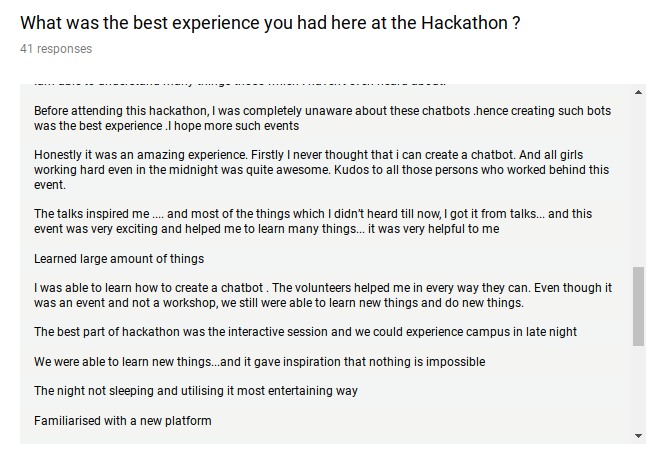 The Good!
The Good!
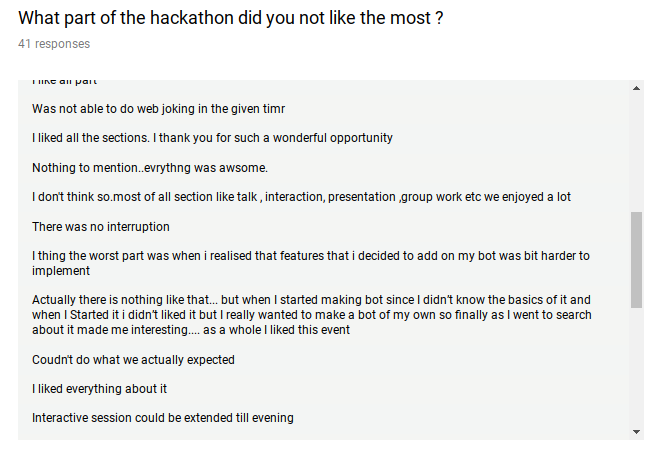 The Not so Good
The Not so Good
Hack the Night, despite everything, was a dream come true — but I’d also like to see it as the first of many steps to be taken.
Our techno-cultural management fest which took place every three years was just around the corner, and some of the girls banded up to create chatbots for display in their AI and IOT stalls. A few of the participants are now part of a group called SHE-coders, an initiative under a few alumni that aims to slowly equip participants to undertake projects through completion of weekly coding tasks.
Hack the Night might be over, but seeing the badges happily being sported by our girls, I hope the spirit of that night is being carried along with them wherever they go.
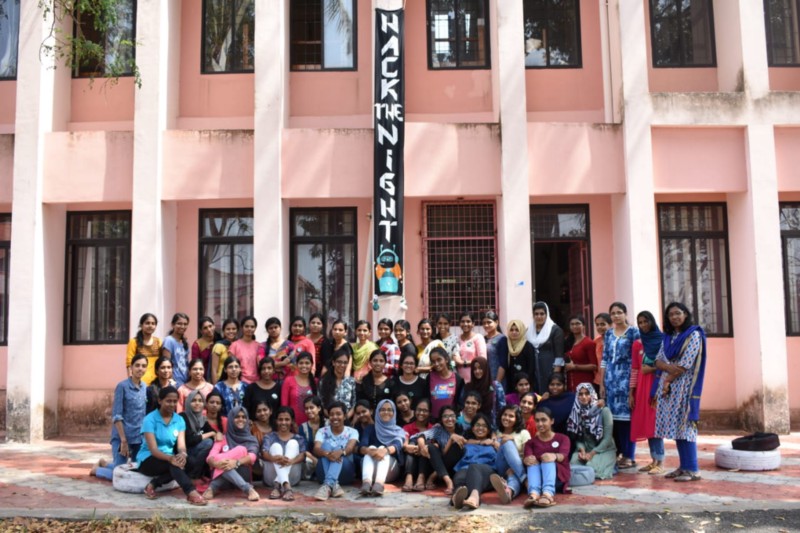 {:style=“margin: 0 auto; display: block;”}
That’s all folks!
{:style=“margin: 0 auto; display: block;”}
That’s all folks!
Acknowledgements
Bindu Ma’am and Vandana Ma’am were the pillars that propped up the whole event. As HOD, Bindu Ma’am ensured that we got the right technical support at all times, as well as by staying overnight at the venue. Vandana Ma’am stepped in and connected us with with alumni network at the right time, which is something we were sorely lacking in.
Aishwarya and Anjali from ICFOSS were integral for the conduct of this event. While Aishwarya was the person who first inspired the concept of a 24-hour women hackathon, it was Anjali who was my point of contact for all the support we received over the course of the event taking its shape.
Hack the Night was for girls, completely organized by girls. While this is true for the most part, there were a few men behind the scenes as well.
Firstly, Asokan sir — staff advisor for ISTE, and the first person to be approached at the sign of any and all trouble. Without his support, perhaps this event might not have taken off at all.
Sreehari — first person who convinced me that an event of this sort was possible, to go straight ahead and see what happens. Prepared the shitty first draft, proof read all the emails, and had our back at all times — among a hundred other things, so there’s that too.
Atthri — mentor and role model when it comes to event management. Gave a detailed overview of all the possible work lying ahead, the task force that would be needed, and all the possible issues that could arise (even though it didn’t come to that, thankfully).
Amegh — a totally calm and confident pillar of strength, and the one to initially plan out all our food related requirements; before suggesting that the event be completely organized by girls and handing over those tasks to Ashika, while providing all other sorts of support throughout.
Arfad — for stepping up and working overtime in times of need, specially when we were worried that the participant count could be lesser than expected, despite the efforts being put in.
Dhyan — thanks for designing the badges, buddy. (And the t-shirts, although we unfortunately had to cancel that plan keeping the budget in mind).
Hashim, Maneesh and Athul — for preparing the posters at the last minute and for patiently listening to each and every crazy modification that we requested.
And finally — there were quite a lot who have been incredibly supportive throughout, in ways big and small. Let’s hope to keep this community intact, to learn from our mistakes, and to grow forward together.